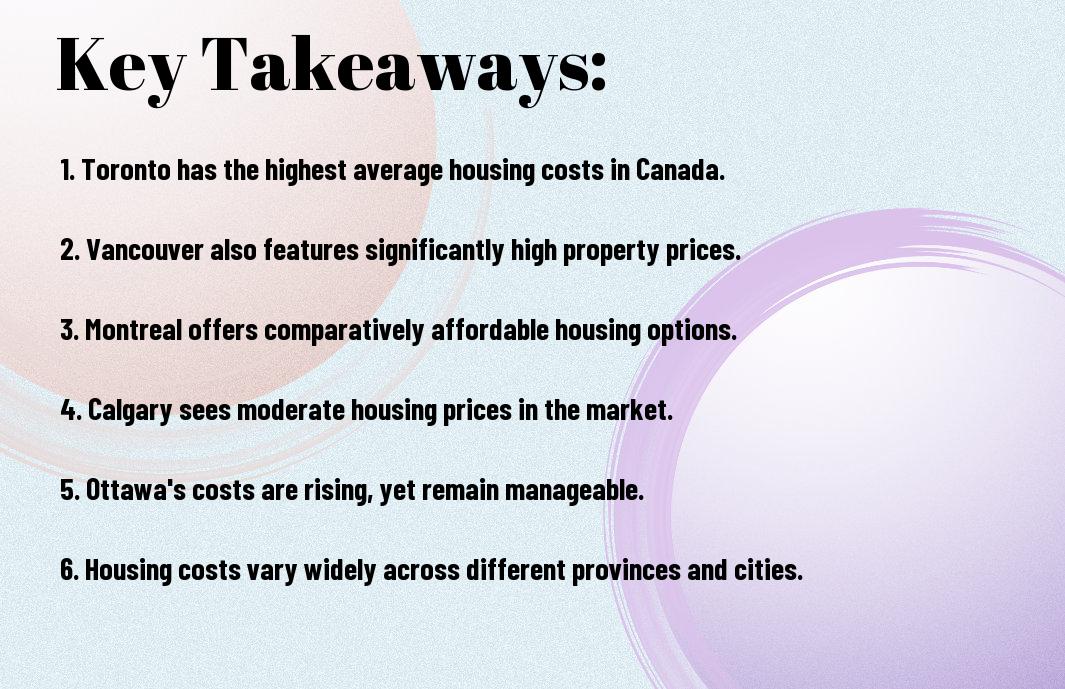Estimated reading time: 22 minutes
Table of contents
If you’re considering relocating to a major Canadian city, you’ll want to know the average housing costs. Your decision will depend on factors like budget and lifestyle. You can find detailed information on Tracking Canadian Housing Market Affordability (1999 to present) via historical housing market trends. Understanding these costs will help you make an informed decision about your future home.
Key Takeaways:
To understand the housing market in Canada’s major cities, consider the following points:
- The average cost of housing varies significantly across different cities in Canada, with cities like Vancouver and Toronto being the most expensive due to high demand and limited supply.
- Housing prices are influenced by factors such as location, with downtown areas and neighborhoods with good schools and amenities tends to be more costly than suburban or rural areas.
- When considering the cost of living, it’s also important to factor in additional expenses such as property taxes, insurance, and maintenance, which can add up and impact the overall affordability of housing in Canada’s major cities.


Overview of Canadian Housing Market
The Canadian housing market is a complex and multifaceted entity, with various factors influencing its trends and prices. As you consider purchasing or renting a home in one of Canada’s major cities, it’s crucial to understand the current state of the market. You’ll want to stay informed about the national trends, regional variations, and local conditions that affect housing costs. By doing so, you’ll be better equipped to make an informed decision about your housing options and find a place that fits your budget and lifestyle.
The Canadian housing market has experienced significant growth in recent years, driven by a combination of factors, including low interest rates, government policies, and demographic changes. As you navigate the market, you’ll notice that prices and trends can vary greatly depending on the location, type of property, and other factors. You’ll need to consider your own needs and priorities, such as proximity to work, schools, and amenities, as well as your budget and financial situation.
National Trends
Those familiar with the Canadian housing market know that national trends play a significant role in shaping the overall direction of the market. You’ll observe that the national trends are influenced by factors such as economic conditions, government policies, and demographic changes. As you analyze the market, you’ll notice that these trends can have a significant impact on housing prices, affordability, and availability. You’ll want to stay up-to-date on the latest national trends to make informed decisions about your housing options.
These trends can also vary over time, and you’ll need to consider the current market conditions as you make your decisions. You’ll want to look at factors such as interest rates, employment rates, and migration patterns, as these can all impact the housing market. By understanding the national trends, you’ll be better equipped to navigate the market and find a home that meets your needs and budget.
Regional Variations
Any discussion of the Canadian housing market would be incomplete without considering regional variations. You’ll find that different regions and cities have unique characteristics, advantages, and challenges that affect the local housing market. As you explore the various regions, you’ll notice that prices, availability, and affordability can vary significantly from one area to another. You’ll want to consider these regional variations as you decide where to live and what type of property to purchase or rent.
Any attempt to generalize the Canadian housing market would overlook the distinct regional differences that exist. You’ll need to consider the local economy, job market, and lifestyle when evaluating the housing options in each region. You’ll want to weigh the pros and cons of each area, considering factors such as commute times, access to amenities, and community character.
For instance, you may find that cities like Vancouver and Toronto have highly competitive markets with high prices, while other cities like Montreal or Calgary may offer more affordable options. You’ll want to investigate the specific conditions in each region, taking into account factors such as local employment opportunities, transportation options, and cultural attractions. By doing so, you’ll be able to make a more informed decision about which region and city best fit your needs and budget, and find a home that suits your lifestyle and preferences.

Housing Costs in Major Cities
Even if you’re familiar with the general trend of housing costs in Canada, it’s vital to research deeper into the specifics of each major city to get a better understanding of what you can expect. As you consider your options, you’ll want to examine the average costs of housing in cities like Toronto, Vancouver, and Montreal. Your decision will likely be influenced by factors such as job opportunities, lifestyle, and personal preferences, but knowing the average housing costs will help you make a more informed decision.
When evaluating your options, you’ll find that each city has its unique characteristics and housing market. Your research will show that the housing market in Canada is diverse, and what you can afford in one city may not be feasible in another. As you explore the different cities, you’ll notice that the average housing costs can vary significantly, and you’ll want to consider these costs in relation to your income, lifestyle, and other expenses.
Toronto
Before making a decision about moving to Toronto, you should know that the city has one of the most expensive housing markets in Canada. You’ll find that the average cost of a detached house in Toronto is around $1 million, while condominiums and townhouses are slightly more affordable, with prices ranging from $600,000 to $900,000. As you consider your options, you should also factor in the costs of living in Toronto, including transportation, food, and entertainment, to ensure that you can afford the lifestyle you want.
As you explore the Toronto housing market, you’ll notice that prices can vary significantly depending on the neighborhood and amenities. You may find that you can afford a more spacious home in the suburbs, but you’ll need to consider the commute time and transportation costs. On the other hand, living in the city center may offer more convenience and amenities, but you’ll likely pay a premium for the location. Your decision will depend on your priorities and what you’re willing to compromise on.
Vancouver
Around the same time you start considering Toronto, you may also want to look into Vancouver, which has a similarly competitive housing market. You’ll find that the average cost of a detached house in Vancouver is over $1.5 million, while condominiums and townhouses range from $700,000 to $1.2 million. As you evaluate your options, you should consider the trade-offs between living in Vancouver and other cities, including the climate, job opportunities, and cultural attractions.
As you research deeper into the Vancouver market, you’ll notice that the city has a unique set of challenges and opportunities. You may find that the proximity to nature, mild climate, and cultural diversity make Vancouver an attractive option, but you’ll need to weigh these benefits against the high housing costs and competitive job market. Your decision will depend on your priorities and what you value most in a city.
Plus, as you consider Vancouver, you should also think about the surrounding neighborhoods and suburbs, which may offer more affordable options. You may find that cities like Burnaby, Richmond, or Surrey offer a more affordable alternative to Vancouver, with prices ranging from $500,000 to $1 million for a detached house. Your research will help you determine which neighborhoods and suburbs best fit your needs and budget.
Montreal
By contrast, Montreal may offer a more affordable option for you, with average housing costs significantly lower than in Toronto or Vancouver. You’ll find that the average cost of a detached house in Montreal is around $400,000, while condominiums and townhouses range from $250,000 to $500,000. As you consider Montreal, you should think about the city’s unique culture, history, and lifestyle, which may offer a great fit for your preferences and priorities.
As you explore the Montreal market, you’ll notice that the city has a distinct character, with a mix of old and new neighborhoods, cultural attractions, and a vibrant food scene. You may find that Montreal offers a great balance of affordability, lifestyle, and job opportunities, making it an attractive option for you. Your decision will depend on your individual circumstances and what you’re looking for in a city.
The diversity of Montreal’s neighborhoods is also worth considering, as you’ll find a range of options to suit different tastes and budgets. You may prefer the historic charm of the Old Port, the trendy vibe of the Plateau Mont-Royal, or the family-friendly atmosphere of the suburbs. Your research will help you determine which neighborhood is the best fit for you and your lifestyle.
Factors Influencing Housing Costs
After considering the average costs of housing in Canada’s major cities, you’ll want to understand the factors that influence these costs. As you probe into the world of Canadian real estate, you’ll find that several factors come into play when determining the cost of housing. Some of the key factors include:
- Location
- Economy
- Demand and Supply
You can find more information on Understanding the cost of buying a home in Canada’s largest cities, which will help you make informed decisions about your housing needs. This will enable you to navigate the complex Canadian housing market with confidence.
Location
Costs associated with housing vary greatly depending on the location. You’ll find that cities like Toronto and Vancouver tend to have higher housing costs due to their proximity to amenities, job opportunities, and entertainment. As you consider your housing options, you’ll need to weigh the benefits of living in a particular location against the potential costs. For instance, a house in a suburban area may be more affordable, but you’ll need to factor in the cost of transportation to and from work or other amenities.
Additionally, the quality of schools, safety, and access to green spaces can also impact housing costs in a given location. As you evaluate your options, you’ll want to consider what matters most to you and your family, and whether the costs associated with a particular location are worth the benefits. By doing your research and understanding the local market, you can make an informed decision that meets your needs and budget.
Economy
Understanding how economic factors influence housing costs can help you make predictions about future trends and plan your housing strategy accordingly. As you consider your housing options, you’ll want to keep an eye on economic indicators and adjust your expectations and budget accordingly. By staying informed and adapting to changing economic conditions, you can make the most of your housing investment.
Demand and Supply
On the surface, the relationship between demand and supply seems straightforward: when demand is high and supply is low, prices tend to rise. As you evaluate the housing market in Canada’s major cities, you’ll want to consider how demand and supply dynamics are impacting costs. For instance, if a city is experiencing rapid population growth, demand for housing may outstrip supply, driving up costs. On the other hand, if a city has an oversupply of housing, prices may drop.
At the end of the day, you’ll want to carefully consider the demand and supply dynamics in your desired location to get a sense of how they may impact housing costs. As you weigh your options, you’ll want to think about whether the current market conditions are likely to drive up or drive down costs, and plan your housing strategy accordingly. By understanding the interplay between demand and supply, you can make informed decisions about your housing needs and find the best fit for your budget and lifestyle.
Types of Housing and Their Costs
Unlike other countries, Canada’s major cities offer a diverse range of housing options to suit your needs and budget. You can choose from apartments, houses, townhouses, and other types of housing, each with its own unique characteristics and price points. When considering the cost of housing in Canada’s major cities, you should take into account the following factors:
- Location
- Size
- Amenities
- Condition
- Age of the property
The following table provides a breakdown of the average costs of different types of housing in Canada’s major cities:
| Type of Housing | Average Cost |
|---|---|
| Studio Apartment | $1,200 – $1,800 per month |
| 1 Bedroom Apartment | $1,500 – $2,500 per month |
| 2 Bedroom Apartment | $2,000 – $3,500 per month |
| 3 Bedroom House | $2,500 – $4,500 per month |
| Townhouse | $2,000 – $4,000 per month |
Apartments
About 40% of Canadians live in apartments, which are a popular choice for singles, couples, and small families. You can find apartments in high-rise buildings, low-rise buildings, or converted houses, each with its own unique character and amenities. When looking for an apartment, you should consider factors such as location, size, and amenities, as these can affect the cost of rent or ownership.
About 20% of apartments in Canada’s major cities are rented, while the remaining 80% are owned by individuals or families. As a prospective buyer or renter, you should research the local market to determine the average cost of apartments in your desired area, as prices can vary significantly depending on the location and amenities.
Houses
About 60% of Canadians live in houses, which offer more space and privacy than apartments. You can find houses in various sizes and styles, from small bungalows to large mansions, each with its own unique character and features. When looking for a house, you should consider factors such as location, size, and condition, as these can affect the cost of ownership.
About 70% of houses in Canada’s major cities are owned by individuals or families, while the remaining 30% are rented. As a prospective buyer, you should research the local market to determine the average cost of houses in your desired area, as prices can vary significantly depending on the location and features.
For instance, a detached house in Toronto can cost anywhere from $800,000 to $2 million, while a similar house in Vancouver can cost between $1 million and $3 million. You should also consider additional costs such as property taxes, insurance, and maintenance when calculating the total cost of ownership.
Townhouses
At around 10% of the housing market, townhouses are a less common but still popular option for Canadians. You can find townhouses in various sizes and styles, from small units to large complexes, each with its own unique character and amenities. When looking for a townhouse, you should consider factors such as location, size, and condition, as these can affect the cost of ownership.
At the higher end of the market, you can find luxury townhouses with high-end finishes and amenities, while at the lower end, you can find more affordable options with basic features. As a prospective buyer or renter, you should research the local market to determine the average cost of townhouses in your desired area, as prices can vary significantly depending on the location and features.
Indeed, townhouses can offer a great compromise between apartments and houses, providing more space and privacy than an apartment while being more affordable than a house. You should consider townhouses as an option if you are looking for a more affordable and low-maintenance housing solution, as they often come with shared amenities and services such as snow removal and lawn care.
Comparison of Housing Costs Across Cities
For those looking to navigate the Canadian real estate market, understanding the average costs of housing in major cities is vital. You can compare the costs of housing across different cities using the following table:
| City | Average Housing Cost |
|---|---|
| Toronto | $1,000,000 |
| Vancouver | $900,000 |
| Montreal | $400,000 |
This table provides a general idea of the average housing costs in major Canadian cities, allowing you to make informed decisions about your housing options. You can use this information to compare the costs of housing in different cities and choose the one that best fits your budget and needs.
Rent
With the rising costs of housing in Canada, you may be considering renting as a more affordable option. You can expect to pay around $2,000 per month for a one-bedroom apartment in Toronto, while in Vancouver, the average rent for a one-bedroom apartment is around $1,800 per month. In Montreal, you can find a one-bedroom apartment for around $1,200 per month. These prices may vary depending on the location, amenities, and time of year.
When considering renting, you should also factor in additional costs such as utilities, internet, and parking. You may also want to consider the pros and cons of renting versus buying, including the flexibility of renting and the long-term benefits of owning a property. As you weigh your options, you can use online resources to find the most up-to-date information on rental prices and availability in your desired city.
Buying
After deciding to purchase a property, you will need to consider the various costs associated with buying a home in Canada. You can expect to pay around 5% of the purchase price in closing costs, including land transfer taxes, legal fees, and inspection fees. Additionally, you will need to consider the cost of mortgage insurance, property taxes, and maintenance costs. As you navigate the home-buying process, you should also consider working with a real estate agent to help you find the right property and negotiate the best price.
As you consider your options for buying a home, you should also think about your long-term goals and how they may impact your decision. You may want to consider factors such as the quality of local schools, access to public transportation, and the overall quality of life in your desired neighborhood. By carefully considering these factors, you can make an informed decision and find the right home for your needs and budget.
Due to the complexity of the home-buying process, it is vital to do your research and seek professional advice when needed. You can work with a financial advisor to determine how much you can afford to spend on a home and to explore your options for financing. Additionally, you can work with a real estate agent to find the right property and navigate the home-buying process.
Long-term Investments
After purchasing a home, you may want to consider making long-term investments to increase the value of your property. You can consider renovations, such as updating the kitchen or bathroom, or adding additional features, such as a backyard patio or home office. As you make these investments, you should also consider the potential return on investment and how they may impact the resale value of your property.
As you think about your long-term goals, you may also want to consider the potential for rental income or resale value. You can work with a real estate agent to determine the potential for rental income or resale value in your desired neighborhood. By making informed decisions and planning for the future, you can maximize the value of your investment and achieve your long-term goals.
Hence, it is vital to approach the Canadian real estate market with a clear understanding of your options and goals. You can use online resources and work with professionals to navigate the market and make informed decisions. By doing your research and planning carefully, you can find the right property and achieve your long-term goals, whether you are renting or buying.

Affordability and Financial Implications
Once again, the issue of housing affordability comes to the forefront when considering the average costs of housing in Canada’s major cities. As you navigate the complex landscape of real estate, you will need to carefully evaluate your financial situation and consider the implications of your decisions. Your ability to afford a home will depend on a variety of factors, including your income, credit score, and debt obligations.
As you weigh your options, you will need to think about the long-term financial implications of your choices. Your financial stability and security will be heavily influenced by the decisions you make regarding housing. You should consider factors such as interest rates, property taxes, and maintenance costs when determining how much you can afford to spend on a home. Your budget will play a significant role in shaping your decisions, and you will need to be mindful of your spending habits and saving strategies in order to achieve your goals.
Mortgage Payments
Along with the initial purchase price of a home, you will also need to consider the ongoing costs associated with mortgage payments. As you explore your options, you will need to think about the amount you can afford to borrow and the terms of your mortgage. Your mortgage payments will be influenced by factors such as interest rates, amortization periods, and payment frequencies. You should carefully evaluate your financial situation and consider seeking the advice of a financial advisor to ensure that you are making informed decisions.
Alongside your mortgage payments, you will also need to consider other costs associated with homeownership, such as property taxes, insurance, and maintenance. Your ability to afford these costs will depend on your income and expense profile, and you should carefully evaluate your budget to ensure that you can meet your financial obligations. You may need to make adjustments to your spending habits or explore options for reducing your costs in order to achieve your goals.
Savings and Budgeting
About the time you start thinking about buying a home, you should also consider your savings and budgeting strategies. Your ability to save for a down payment and cover ongoing expenses will be imperative to your success. You should evaluate your income and expenses, and make adjustments as needed to ensure that you are saving enough to meet your goals. Your budget will play a critical role in shaping your decisions, and you should prioritize needs over wants in order to achieve financial stability.
Approximately 20% of your income should be allocated towards savings and debt repayment, including your mortgage payments. You should also consider setting aside funds for emergencies and unexpected expenses, such as home repairs or maintenance. Your financial stability and security will depend on your ability to manage your finances effectively, and you should seek the advice of a financial advisor if you are unsure about the best course of action.
Implications of poor savings and budgeting habits can be severe, and you may find yourself struggling to make ends meet or facing financial difficulties. You should prioritize your financial stability and security, and make informed decisions about your housing options. Your financial future is dependent on the choices you make today, and you should take a proactive approach to managing your finances.
Government Policies and Incentives
Above all, you should be aware of the government policies and incentives that are available to help with housing affordability. After researching your options, you may find that there are programs and initiatives that can help you achieve your goals. Your government may offer incentives such as tax credits, grants, or subsidies to help with down payments or mortgage insurance. You should evaluate these options carefully and determine which ones are available to you.
Around the same time, you should also consider the impact of government policies on the housing market. You may find that changes to interest rates, tax laws, or regulatory requirements can have a significant impact on your ability to afford a home. You should stay informed about these developments and adjust your plans accordingly. Your ability to navigate the complex landscape of real estate will depend on your knowledge and understanding of these factors.
Even with the help of government policies and incentives, you will still need to carefully evaluate your financial situation and make informed decisions about your housing options. You should prioritize your financial stability and security, and seek the advice of a financial advisor if you are unsure about the best course of action. Your financial future is dependent on the choices you make today, and you should take a proactive approach to managing your finances.
To wrap up
So, as you consider relocating to one of Canada’s major cities, you’ll want to factor in the average costs of housing to determine which location best fits your budget. You’ll find that cities like Toronto and Vancouver tend to have higher housing costs, with the average price of a detached home ranging from $1 million to over $1.5 million. On the other hand, cities like Montreal and Calgary offer more affordable options, with average housing prices ranging from $400,000 to $600,000. As you weigh your options, you’ll want to consider not only the purchase price but also ongoing costs like property taxes, insurance, and maintenance.
As you plan your move, you should also consider your personal preferences and priorities, such as commuting time, access to amenities, and community vibe. You may find that your budget can stretch further in certain neighborhoods or cities, allowing you to afford a larger home or more desirable location. By doing your research and understanding the average costs of housing in Canada’s major cities, you’ll be better equipped to make an informed decision about where to settle and how to allocate your resources. Your housing budget will be a significant factor in determining your overall quality of life, so it’s crucial to get it right and find a location that meets your needs and fits your budget.
FAQ
Q: What are the average housing costs in Toronto, Canada’s largest city?
A: The average housing costs in Toronto vary depending on the type of accommodation. The average price of a detached house is around $1.2 million CAD, while semi-detached houses and townhouses cost around $900,000 CAD and $700,000 CAD, respectively. Renters can expect to pay approximately $2,000 CAD per month for a one-bedroom apartment in the city center.
Q: How do housing costs in Vancouver compare to other major Canadian cities like Montreal and Calgary?
A: Vancouver is known for being one of the most expensive cities in Canada in terms of housing. The average price of a detached house in Vancouver is around $1.5 million CAD. In contrast, Montreal offers more affordable options, with the average price of a detached house being around $450,000 CAD. Calgary falls somewhere in between, with average detached house prices of around $480,000 CAD. Rent prices also vary, with Vancouver being the highest at around $2,200 CAD per month for a one-bedroom apartment, followed by Calgary at $1,400 CAD, and Montreal at $1,300 CAD.
Q: Are there any affordable housing options available in Canada’s major cities for students and low-income individuals?
A: Yes, there are affordable housing options available in Canada’s major cities for students and low-income individuals. Many universities offer affordable on-campus housing for students, with prices starting from around $800 CAD per month for a shared room. Additionally, some cities have initiatives in place to provide subsidized housing for low-income individuals and families. For example, the City of Toronto has a program that offers affordable housing units for as low as $500 CAD per month. It’s also worth considering neighborhoods that are a bit further from the city center, as they often offer more affordable rent prices without sacrificing too much in terms of accessibility and amenities.





